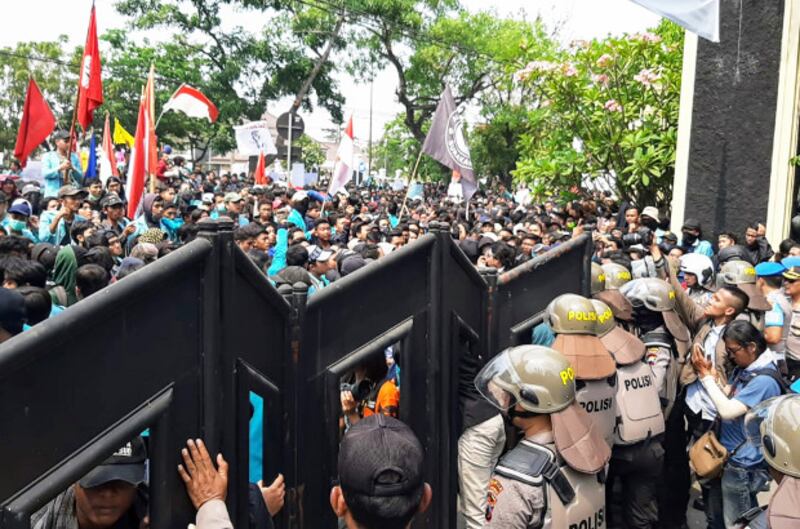Indonesian riot police clashed with protesters in Jakarta, Makassar, Medan and two other cities Tuesday, on the second day of nationwide rallies over fears that lawmakers are attempting to roll back democratic reforms and other concerns.
In Jakarta, about 3,000 students who tried to force their way into the House of Representatives (DPR) building were prevented by police firing tear gas and water cannons.
“We want to meet with DPR leaders. Come here, talk to us,” said a protest leader, standing on the back of a truck fitted with loudspeakers.
Police also battled rock-throwing protesters in Makassar, the capital of South Sulawesi province, and Medan, the main city in North Sumatra province. Medan protesters vandalized and burned police vehicles, according to local media.
Meanwhile in Bandung, several students fainted after police fired tear gas and water cannons at protesters who tried to tear down a gate at the West Java council building, local media reported.
“There was vandalism and provocation to pit the police against the students at the scene,” West Java police spokesman Trunoyudo Wisnu Andiko said, according to Merdeka.com.
Seven-point declaration
In a seven-point declaration, protesters made a raft of demands, including an end to forests fires set for agricultural purposes and to “militarism” in the rebellious Papua region in eastern Indonesia, and freedom for political prisoners there.
The declaration called for the government to pass laws to reduce sexual violence and to protect domestic workers, and to hand down justice for perpetrators of past human rights abuses.
Protesters demanded the government revoke recent changes to the law governing the Corruption Eradication Commission (KPK) and reject proposed revisions to the nation’s criminal code.
Transparency International, a Berlin-based NGO that monitors corruption worldwide, said the KPK revision “demonstrates continuous efforts by legislators to systematically weaken the institution.”
KPK changes include establishing a supervisory agency tasked with monitoring the commission’s conduct and restricting its ability to wire-tap suspects.
Since it was established in 2002, the KPK has secured the convictions of former ministers, governors, central bankers, legislators, as well as business tycoons, making it one of the most respected and feared institutions in the country
University of Indonesia student Rifqi Siregar called on the government to listen to the people.
“The revisions to the criminal code are riddled with flaws. The government must be firm in fighting corruption by rejecting the new law on KPK,” he told BenarNews.

Parliament postpones vote
Tuesday’s protests occurred on the same day parliament postponed a vote on the criminal code that would ban insulting the president and penalize consensual sexual contact outside of marriage. Jokowi had requested the postponement to allow for deliberations by the next parliament, which is to be seated in October.
It also postponed votes on three other bills, including one governing the prison system, which critics said contains provisions allowing home leave for prisoners and removing restrictions on sentence cuts for those convicted of corruption, House speaker Bambang Soesatyo told reporters.
“This should give time for the government and the House to study and inform the public better about the content of the bills so they can be better understood,” Bambang said. “We are listening to the voices of the young people out there.”
The bill to change the criminal code would have allowed a prison sentence of up to one year for consensual sex outside of marriage while a couple living together without being married could face a sentence of up to six months. The bill requires complaints from spouses, parents or children for police to press charges.
In addition, anyone convicted of insulting the president or vice president could face a prison term of up to 4½ years. Insulting the president and vice president was decriminalized by the Constitutional Court in 2016 following a legal challenge.
Presidential Chief of Staff Moeldoko said Jokowi was dealing with issues including fresh violence in Papua province that left 32 people dead on Monday, and forest fires on Sumatra and Borneo islands.
“What should be understood is that the government has reached an agreement with the House of Representatives to deliberate revisions of the criminal code, the agrarian bill, the corrections bill and the others,” Moeldoko told reporters. “Don’t add more burdens to the president who is already dealing with difficult situations.”
